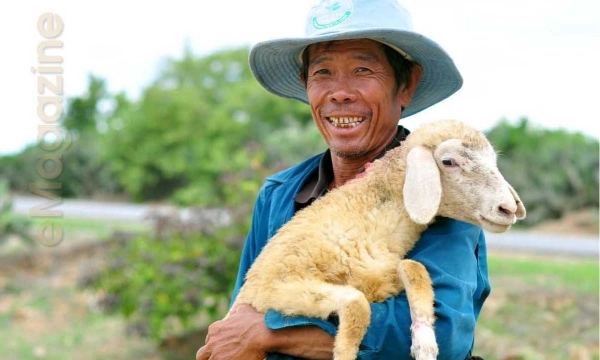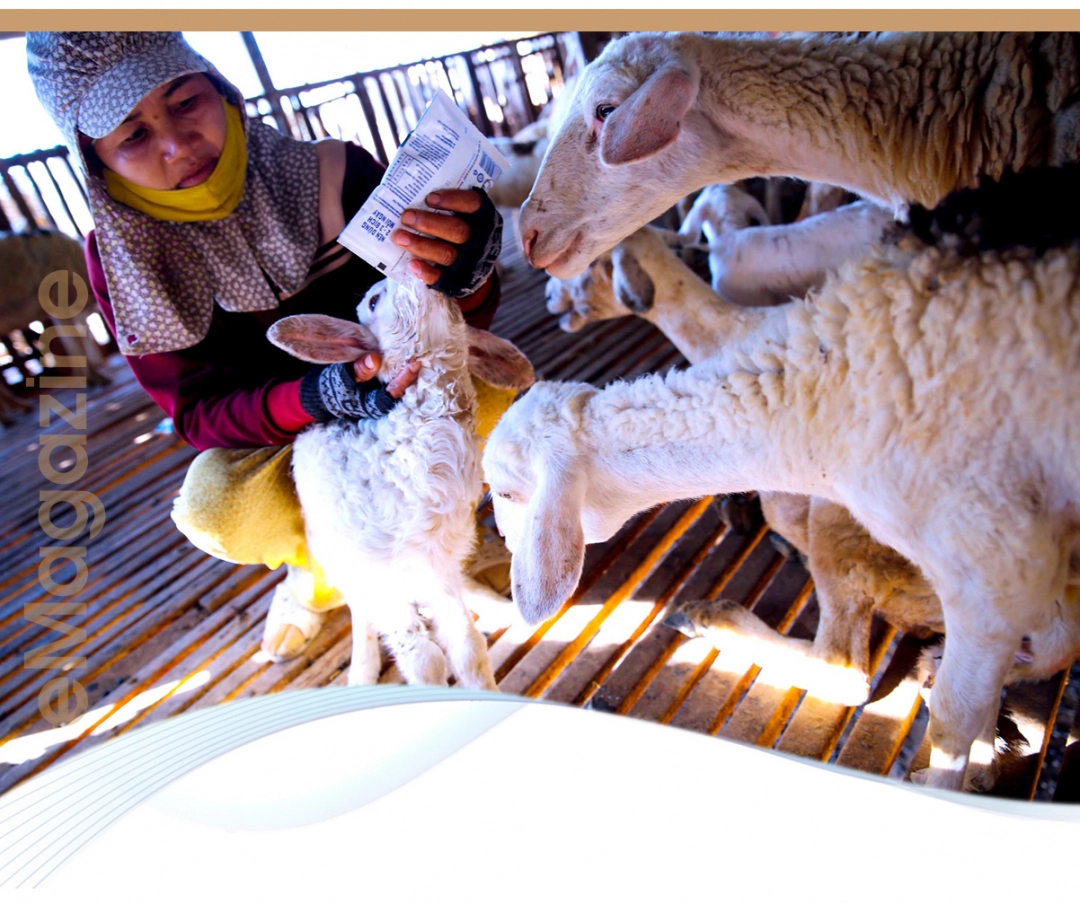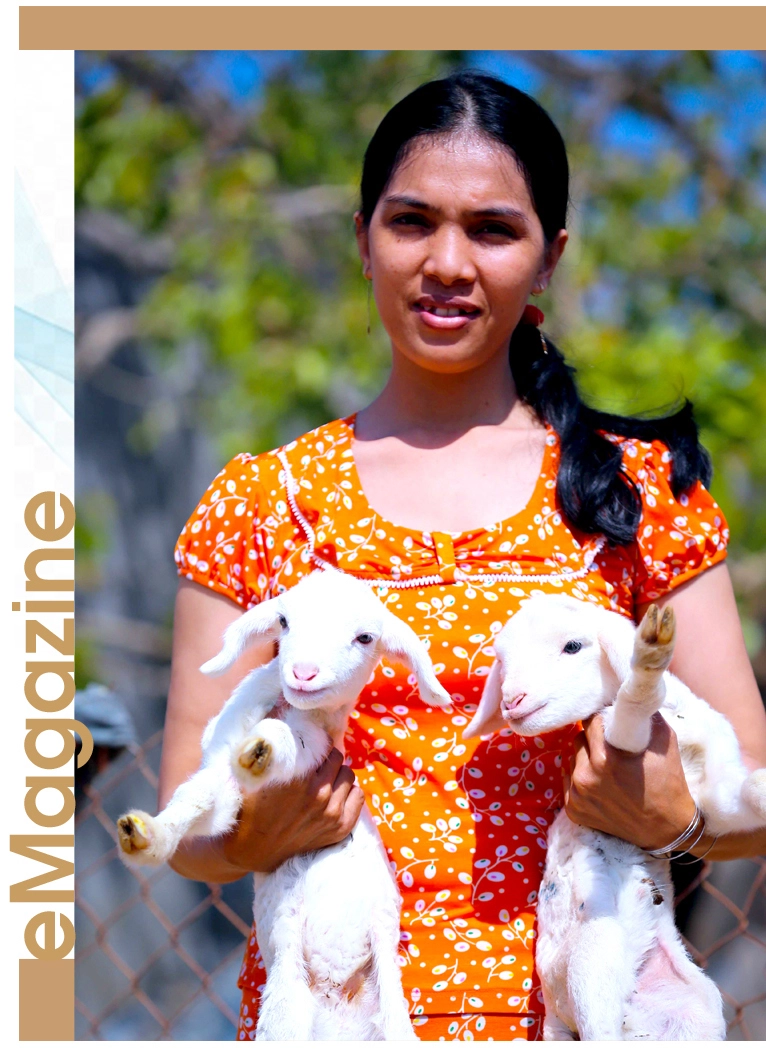November 26, 2025 | 11:42 GMT +7
November 26, 2025 | 11:42 GMT +7
Hotline: 0913.378.918
November 26, 2025 | 11:42 GMT +7
Hotline: 0913.378.918

Ninh Thuan sheep breed provides quite a good meat quality while has a strong resistance to diseases. Photo: Trong Chinh - Minh Hau.
The province is domestically called “chảo lửa” (fire pan) due to its long-lasting droughts and fierce heat weather.
However, it has favorable conditions for developing the breeding of horny cattle such as goats, cows, and sheep among which, sheep raising and processing have become a strength of the provincial economy.
Ninh Thuan sheep breeds provide quite a good meat quality while have a strong resistance to diseases, according to scientific researches basing on practical proof of the Ninh Thuan Department for Science and Technology.
The research conducted for the registration of geographical indications of sheep products in the province has shown that Ninh Thuan sheep is a gentle animal and can suffer from hard-living conditions, thus it is very easy for growing.
Ninh Thuan sheep can live well on arid fields with poor food.
Although sheep are being raised in many localities in the country, those in Ninh Thuan are regarded as the only typical commercial sheep breeds in Vietnam today due to its biological climate adaption features in addition to its meat products quality rated at a high level.
The meat is delicious and clean meeting all market inquiries of nutrition and food safety.

Sheep raising in Ninh Thuan now mainly follows the natural grazing model. Photo: Trong Chinh - Minh Hau.
Natural conditions in Ninh Thuan along with biological characters and local farming tradition have made up the reputation for Ninh Thuan sheep products.
Sheep raising in Ninh Thuan now mainly follows the model of natural grazing. Sheep are grazed on mountain slopes, barren hills, grazing grounds, and after-harvest rice fields.
The sheep can eat a wide variety of food, but mainly species of grass and plants including leaf stalks, seeds of leguminous plants such as apricot blossom, elephant grass, stylo grass, and hedgehog, jackfruit leaves, amniotic leaves, and acacia beans.

Ninh Thuan sheep can eat many kinds of food. Photo: Trong Chinh - Minh Hau.
They can also have agricultural by-products such as soybean carcasses and peels of jackfruit, banana, papaya, pumpkin, turnip, and dragon fruit.
Time for sheep to be naturally grazed is about 8-10 hours per day (8:00 am-5:00 pm). Each day, the sheep can eat a food amount of 12-15% according to its weight, equivalent to 5-6kg of grass. In addition, they also need a quantity of refined food of 0.2-0.3 kg per head per day.
After a grazing session, the breeders often add some agricultural and industrial by-products, or more forage such as grasses of many kinds, to feed the sheep in the evening.
As the sheep prefer to live in high, well-lit places, the barn must meet the requirements of being dry, airy, easy to drain, and convenient for breeders to move and take care of them.
It is usually advised to take advantage of the available local materials to build the barn.
In 2004, Ninh Thuan Agricultural Promotion Center imported 2 sheep breeds especially for meat production including 15 Dorper and 15 White Suffolk sheep originated from Australia.

Ninh Thuan sheep can live well on arid fields with poor food. Photo: Trong Chinh - Minh Hau.
After a period of experimental raising, the results showed their adaptability to climatic conditions in Ninh Thuan thus the crossbred sheeps had a growth level of over 10-15% compared to the native Ninh Thuan breed.
With good results in growth ability, weight, meat quality, and disease resistance, the current hybrid sheep between Ninh Thuan indigenous and Australian sheep make up 85-90% of the total herd today.
Ninh Thuan now has a total of 4 breeds of sheep being raised there including the province’s indigenous, the hybrid sheep between Ninh Thuan indigenous and Australian sheep, the Dorper (Australia), and the White Suffolk (Australia).
Author: Huynh Kim So. Translated by Phuong Linh. Edited by Duc Huy.

(VAN) China’s cooking oil is suddenly flooding into India. It all comes down to a soybean surplus that Beijing doesn’t quite know what to do with.

(VAN) An Giang promotes supply-demand connections, standardizes quality and builds value chains, creating a foundation for sustainable bird’s nest development and aiming to expand exports.
/2025/11/24/5339-4-nongnghiep-075331.jpg)
(VAN) Recently, the conference on 'Sustainable Fisheries Linkage Chain - Tilapia for Export' took place in Tien Hai commune, Hung Yen province.
/2025/11/21/4309-2-153400_128.jpg)
(VAN) Green and low-emission rice is paving the way for Vietnamese rice to enter high-end markets, marking the beginning of a transformation journey toward greening and elevating the national rice brand.

(VAN) ‘Right to Win’ outlines a national action plan that shapes a new vision for Viet Nam’s agriculture in an era of renewal and global integration.

(VAN) Lam Dong’s farmed sturgeon output this year is expected to reach 2,300 tons, worth VND 450 billion, affirming the brand’s position on the market.

(VAN) A surge in Ukrainian egg exports, largely driven by soaring sales to the UK over the last few years, has notably pushed up egg prices on the domestic market.